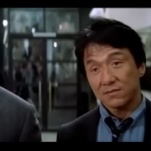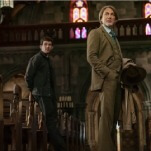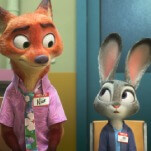"Amour Fou" (season 3, episode 12)
In which everything that’s happened in season three comes to a head.
What are David Chase’s (and by extension The Sopranos’) feelings on women? One of the chief beefs against the show in some quarters when it aired was that it had a low opinion of the XX set. They were either shrewish harpies who did their best to contort men in knots with their manipulative natures or easily duped simpletons who could be bought off by beautiful jewelry or, in the case of Melfi, the biggest impediment to the “Sopranos hates women!” argument, by her number one patient acting as though he might make a breakthrough. I think trying to argue Chase and the series find women to be small-minded and petty is a problematic line of thought, largely because Chase and the series find nearly EVERYone to be small-minded and petty. But if there’s a character those advancing this argument can point to and say, “See?!” it’s probably Gloria Trillo.
Gloria’s role in the show’s third season is very specific: She’s there to be a fill-in for Livia, to provide the show with a way to extend one of its three or four most central relationships beyond the grave. Season three is obsessed with the ways that the past doesn’t match up to the present, with the ways that life in the real world can’t possibly compare to what we’ve imagined in our heads. To that end, Gloria is both the seeming vision of a fantasy girl and a terrible visitation from a ghost. She’s gorgeous, hot to trot, and self-sufficient, but she’s also clingy, desperate, and able to turn just about anything back on Tony without much effort. She’s everything Tony thinks he wants in a woman, but she’s also a cruel echo of the one woman whose unconditional love he could never win.
What’s interesting is that “Amour Fou,” one of the most purely exciting episodes in the whole run of the series, makes the argument that what Tony thinks he wants and what he actually wants (or even needs) are completely different things. (This is a constant theme in the series, and it becomes especially prominent the more we move toward the series’ end.) Tony believes that Gloria is the kind of woman he wants to be with, the kind of woman who could make him happy, but as Melfi points out, the one good decision he made when it comes to women, the one woman he bears any real loyalty to whatsoever, is his wife, who goes under the magnifying glass in this episode as well. Notice that Tony first grows irate with Gloria when he finds out she drove Carmela home (in one of the episode’s best scenes), but he doesn’t snap and try to seriously hurt her until she has the gall to insult Carmela. It’s not until Gloria rants about how she’s not a housewife who can be bought off with a gaudy ring that he starts smacking her around. The scene where he does is so terrifying and so hard to watch that I’m not surprised this episode often gets pointed to by those who call the show anti-feminist. But it’s not as though the show hasn’t prepared us for this moment, nor does it treat Tony’s actions as anything triumphant. He’s an uncaged animal, defending his territory the only way he knows how.
It’s rather remarkable that we’ve gotten this far in the series in these write-ups without doing a great deal of discussion about the marriage of Tony and Carmela Soprano. The series, up until this point, has largely framed this storyline in terms of Carmela, actually, asking openly what she gets out of this marriage and what it is about this life that is enough to keep her silent about everything she knows. But “Amour Fou” digs a little more deeply into Tony’s feelings for his wife than the series has gone before. The Sopranos is many things, but it’s also one of the most honest, unblinking portrayals of a marriage in all its goodness and all its ugliness in American television history. What makes this marriage work? It doesn’t, not really. A lot of it is the fact that Carmela’s willing to overlook lots of things in order to be able to live in comfort, but the flip side of that is also true. Tony is far from the world’s best husband, but there’s something very naked about how much he needs Carmela, not just to keep up appearances but also because she provides some form of stability in his life. What Carmela gets from Tony is rarely in question. What Tony gets from Carmela is harder to suss out, but in “Amour Fou,” at least, it’s someone to come home to.
“Amour Fou,” of course, means “crazy love.” It’s a term Melfi uses to describe the relationship between Gloria and Tony, and this episode suggests it’s largely the opposite of what he has with Carmela. The greatest sin of the Soprano marriage at this point is that it’s sunk into complacency. Carmela considers leaving after what the psychiatrist told her earlier in the season, but once she talks it over with a priest who tells her to focus on the good things about her marriage and leave the bad behind, she backs away from anything so radical as utterly changing her life. She’s still depressed, perhaps seriously depressed. (One thing I love about this season is how it portrays this near breakdown on Carmela’s part almost entirely in the background.) But she’s going to press on, in the hopes that she can somehow build a better, more stable place for Tony, hoping against hope that he’ll become a better man without any real pressure. And so she starts reading up on real estate and keeps on with Tony, the gulf between them widening, despite the occasional truce, as we see in this episode. The Sopranos rarely gets credit for just how well it portrays a long-running marriage that has devolved into something like a grudging partnership. Season three may be the height of that approach.
Anyway, I mentioned above that “Amour Fou” is maybe the most exciting episode in the series’ entire run, so let’s deal with the situation that provides much of the episode’s visceral impact. Jackie, Jr., has heard about a card game run by Eugene Pontecorvo that he wants to knock over, based on a story Ralphie has told him about how Ralphie made his name back in the day. (Am I insane, or did Tony pull off a similar stunt, which we learned about in season two?) After spending much of the day watching basic cable—including the most famous scene from Basic Instinct—Jackie, Jr., and his friends decide to go through with the half-assed plan. Things go about as well as could be expected. Christopher and Furio are at the card game, unexpectedly. Bullets begin to fly when the kids are surprised by someone coming in from the other room, and the dealer ends up dead. The getaway driver flees at the first sound of gunfire. Jackie and his friend battle their way out of the tight spot (hitting Furio in the leg in the process) but wind up outside with nowhere to go. Jackie steals a car but abandons his friend. Chris shoots the friend in the head. And now Tony knows that something needs to be done about the kid he was trying to keep from the mob at all costs.
The Jackie, Jr., storyline is the weakest link in season three, but it roars to life here, paying off a season’s worth of build-up. To a degree, the problem with the storyline had everything to do with the fact that we were always aware Jackie, Jr., wouldn’t stay on the straight and narrow. If everything goes as planned, there’s no conflict. If there’s no conflict, there’s no story, and even on a less plot-driven show like The Sopranos, the writers are never going to back away from something as obvious as this. Thus, all of the time spent watching Jackie, Jr., struggle with his studies or court Meadow felt like time exceptionally wasted. It certainly didn’t help that the character was so weak, with an actor who wasn’t just to the challenge. This does fit into the series’ overall sense that the world of the past is much more alluring and interesting than the world of the present, but it doesn’t make up for boring plotting or acting. By and large, Jackie, Jr., is present JUST for this moment. When the moment comes, it’s electrifying, of course (the series rarely screwed up setpieces this important), but it definitely feels a long time in coming.
“Amour Fou” is also notable for setting up a template The Sopranos would borrow for years to come. While season two’s penultimate episode, “Knight In White Satin Armour,” was more conventionally exciting than the season finale, “Funhouse,” and brought one of the season’s major story arcs to a close, “Funhouse” had its fair share of plot to get through. “Amour Fou,” on the other hand, brings almost everything in season three to a head. Carmela’s depression, Chris’ status as a made man, Jackie, Jr.’s, aspirations, Gloria’s relationship with Tony… all of those stories reach a kind of climax in this episode, with lots of other smaller bits from the season getting wrapped in here and there. Sure, Jackie, Jr., is still free at the end of the episode, and Tony is still wondering what to do about him, but by and large, the storyline is over. Jackie, Jr., has made his move, and he’s overreached. The way the world used to work is no longer an option, and the best hope for Jackie, Jr., is probably a form of banishment.
So the stories have reached the point of climax, leaving the season finale to be a kind of long denouement, show us how the characters shake out, more than how the plot shakes out. It became a seasonal structure the show turned to again and again and again over the years, and it was a structure that would influence numerous other shows on television, most notably fellow HBO series The Wire. This structure for a season actually became so predictable in recent years that there’s been a bit of a reaction against it from some shows. (Both Breaking Bad and Mad Men will frequently have action-packed finales, though Mad Men’s finales will often have as little as possible to do with anything that came before.) In “Amour Fou,” you can sense the show testing the waters, seeing how it would work to get all of the exciting stuff out of the way at once and then go forward with a few ending moments for the characters in the next week.
The episode even ends like a Sopranos season finale! The characters, united by Bob Dylan’s cover of “Return To Me,” go about their lives, as if nothing had happened to rock their worlds. Patsy, having just told Gloria she’d be killed if she ever messed with Tony again, talks on his cell phone and puts shopping bags in his car. Tony and Carmela hang out at home. The dark clouds haven’t dissipated, not exactly, since Tony still has to make his Jackie, Jr., call, but they’re starting to part. Things have worked out, again, and if Tony had to be cruel to make sure they did, well, that’s what makes him good at his job.
The major balance in season three has been the question of the world as it was or the world as the characters wanted it to be and the world they actually got. While “Amour Fou” is notable mostly for its plot developments, every single one of them brings this question of longing vs. actuality to a point of crisis. Carmela wants a different husband. Jackie, Jr., wants the world his father came up in. Tony wants a fun girlfriend but ends up haunted by his mother. As Melfi would tell you, the past is always there, just beneath the surface, waiting to rise up and swallow you whole. In its own way, The Sopranos uses its structures to play these games with the audience. What we expect or what we want sometimes aren’t what we get. And then, as in “Amour Fou,” when we do get what we thought we wanted, it feels hollow. Knowing what you want and getting what you need are two very different things.
Stray observations:
- Who’s that singing over the closing credits? Why, that’s Steve Van Zandt and his band!
- Dealer Sunshine, who also appeared in the series’ other big poker episode, “The Happy Wanderer,” is played by famed Hollywood director Paul Mazursky. It’s always bizarre to me how quickly the various film brats of the ‘70s latched on to The Sopranos after its first season, often clamoring for guest spots.
- Sign of the times: Hillary Clinton is still seen as a shrieking harridan by many of the women at Carmela’s little dinner. On the other hand, the women are all pleased with the fact that she “set up her own thing.” Those general attitudes would evolve into the higher esteem she seems to be held in today. (Being a generally well-liked senator and secretary of state can’t have hurt either.)
- The getaway driver, in case you didn’t catch his identity, is everybody’s favorite drug dealer, Matush.
- Patsy’s not generally a terrifying guy, but he can be threatening when he wants to be. I also love how much it indicates that Tony has completely forgotten about Gloria that he tosses this task to someone as relatively low-ranking as Patsy (at least in terms of the characters on the show).
- I wonder if anyone watching this episode at the time actually thought the show would make Carmela pregnant again? The show usually doesn’t go in for those sorts of twists, but it sometimes will toss one or two in just to fuck with the audience. Fortunately, it’s just a thyroid problem. No one needs to see Tony carting around a baby.
- I’ve always thought that opening in the art museum is well done. Edie Falco tearing up at the pieces of art and, later, at the dog food commercial is such a nicely done reaction.
- Thoughts on having Gloria literally say things Livia used to say? It feels a little heavy-handed to me on this viewing, but I remember being gobsmacked by it the first time I watched this episode.
- "You see, Tuesday, I'm gonna take my kid to see Raffi."
Speaking With The Fishes:
- Carmela’s interest in real estate will grow to become a major plot development as the show continues, particularly in the first half of season six.
- Is this the first mention of “Feech” La Manna? He’ll become a somewhat important character in season five, until the show seems to utterly lose interest in him. Still, he’s played by Robert Loggia!
- This is the final living appearance of Gloria Trillo. Patsy’s threats will get to her so much that she ends up killing herself. She’ll appear in dream sequences and assorted flashbacks in a few future episodes.
Next week: Season three wraps up with “Army Of One,” and we make a special announcement about the future of the Sopranos reviews.








































